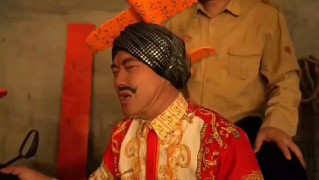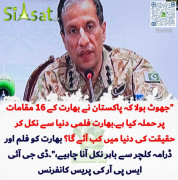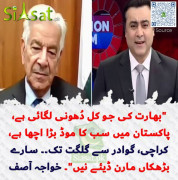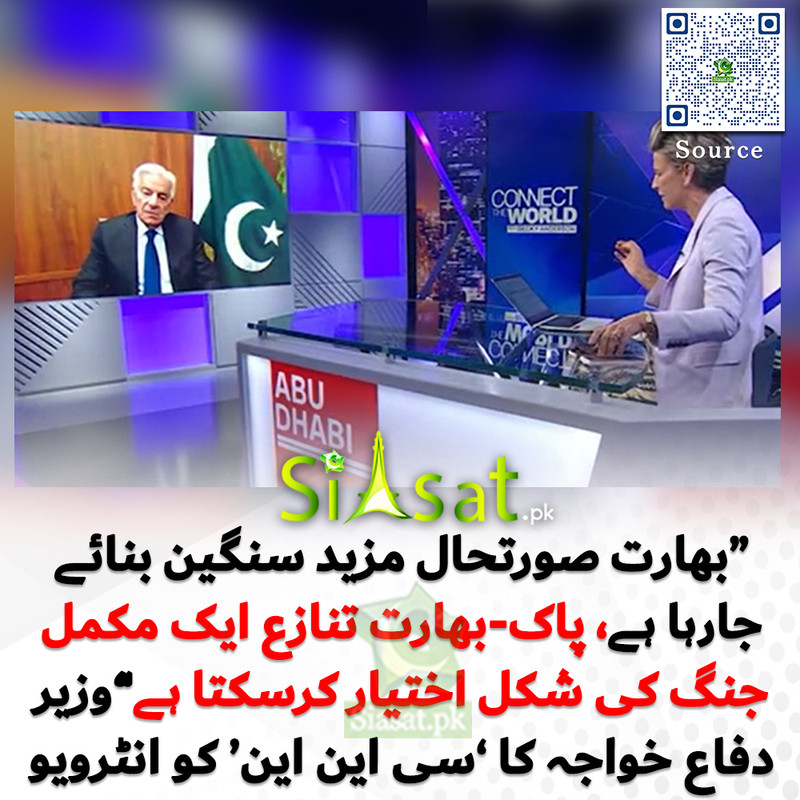You are using an out of date browser. It may not display this or other websites correctly.
You should upgrade or use an alternative browser.
You should upgrade or use an alternative browser.
Imran Khan wants to go Prime Minister house , not Parliament :- Talat Hussain
- Thread starter Rameez Chaudhry
- Start date
Talat, he DOES NOT WANT THE PM HOUSE, THE MANDATE WAS STOLEN, YOU KNOW IT TO BE TRUE.The criminal chore fraud auloo brain fat basterd is Ok? Nawaz Shareeef Saaahaaab? Really?
That's want you want in Pakistan, a two family kunjurr rulers?get your ugly teeth fixed moron. Journalist my foot.
That's want you want in Pakistan, a two family kunjurr rulers?get your ugly teeth fixed moron. Journalist my foot.
O...be...ghiarat..Buzdil..Tallat..teri auqat ye ha ke jab Altaf
ne tujhay dan..da dia tha ..tu us waqt se le kar aj tak
boleny k qabal nahi raha..Syyed zat ki toheen ha tu..
Imran ke pass PM se zayada izzat ha is waqt..Imran ko
shohrat nahi chahay..wo sirf Pakistan ka dukh rakhta ha
jab ke tu...sahafat ke naam par.saya nishan ha..apnay
abao ajdad se poch.ke tu asal Syyed zada ha ke bhi nahi??
ne tujhay dan..da dia tha ..tu us waqt se le kar aj tak
boleny k qabal nahi raha..Syyed zat ki toheen ha tu..
Imran ke pass PM se zayada izzat ha is waqt..Imran ko
shohrat nahi chahay..wo sirf Pakistan ka dukh rakhta ha
jab ke tu...sahafat ke naam par.saya nishan ha..apnay
abao ajdad se poch.ke tu asal Syyed zada ha ke bhi nahi??
Once a society becomes corrupt there are three powerful forces tending
to keep it corrupt. Conversely, the same forces work to keep societies
honest if they start that way. Hence, it is much harder to become
honest than to stay honest. What are the
three powerful forces which perpetuate corruption?
The first is the power of moral norms. Norms are, as the word
suggests, simply what people regard as normal behavior. Moral norms
are those patterns of behavior which people internalize and so try to
enforce on themselves. If someone breaks their own moral norm they
feel bad about doing so, and this feeling bad acts as a disincentive. In
societies which are habitually honest, probably the main incentive to
individual honesty is not the public penalties against corruption but
these private penalties: people don’t want to end up feeling guilty. By
contrast, in a society in which corruption is normal, the psychic
penalties to being corrupt are obviously much less. A person who
behaves corruptly in such a society may worry at some level that they
have done wrong, but their sense of guilt can be assuaged by the
knowledge that most other people are equally guilty. Hence, the same
corrupt action is likely to generate much more severe feelings of guilt
in societies where such behavior is rare than in societies where it is
common.
The second force perpetuating corruption and honesty is the risk of
punishment. In an honest society the risk of punishment is much higher
than in a corrupt society. I have already suggested that in an honest
society a corrupt act gives rise to a stronger sense of guilt because it is
more unusual. If it is detected by others it also gives rise to a stronger
sense of indignation for the same reason. Indignation is the trigger for
disclosure, and so if a corrupt act is detected, it is much more likely to
be reported to the authorities or to the press in an honest society than in
a corrupt society. Once a corrupt act is reported, it is more likely to be
prosecuted and punished in an honest society, again because it is more
atypical. Thus, it is much more dangerous to be corrupt in an honest
society than to commit the same act in a corrupt society.
The third force perpetuating corruption is the power of expectations.
In honest societies people expect others to be honest, in corrupt
societies they expect other people to be corrupt. Imagine that you are a
young person who has just got your first job. In an honest society once
you start your new job people expect you to behave honestly. That is,
by being part of an honest society you inherit a reputation for honesty.
You have not had to earn this reputation, it is simply part of your
inheritance from the previous generation. A reputation for honesty is a
valuable asset. Imagine now that you are someone who wants to buy a
second-hand car. Two people are offering to sell you their cars and the
cars look the same to you. Both people tell you that there is nothing
wrong with the car they are trying to sell you. But one seller has a
reputation for being completely honest, whereas the other has a
reputation for being dishonest. You will buy from the honest man.
Thus, the man with the reputation for honesty will find his reputation
valuable: in this example, he will be able to get a higher price for the
same car than a man with a reputation for dishonesty. More generally,
in honest societies each generation hands on to the next generation the
valuable asset of a reputation for honesty, whereas in corrupt societies
each new generation inherits an initially undeserved expectation that it
will behave corruptly. These expectations tend to be self-fulfilling.
Consider again the young man who has been born into an honest
society and so inherits a reputation for honesty when he gets his first
job. Suppose that he now encounters an opportunity to be corrupt. In
deciding whether to take the corrupt opportunity he faces an important
calculation. If it becomes known that he has been corrupt then, even
aside from the risk of punishment, he will have lost his reputation for
honesty. In other words, by being corrupt he risks losing a valuable
asset. In years to come, all the opportunities which depend upon his
having a reputation for honesty would be forfeited. By contrast, the
young man born into the corrupt society inherits no such asset from the
older generation. Faced with his first opportunity to be corrupt he has
no reputation to lose because people expect him to be corrupt anyway.
Hence, the incentive for new entrants to the labor force to be honest is
stronger in an honest society.
The burden of a poor reputation which young people inherit in
corrupt societies is like a hidden debt burden. Unlike other debt
burdens it cannot be cancelled by international donors: it can only be
cancelled once the established generation changes its own behavior.
To summarize, moral norms, risks of punishment and inherited
reputations all tend to perpetuate honesty in honest societies and
corruption in corrupt societies. This has both encouraging and
discouraging implications. An encouraging implication is that just
because a society has persistent corruption does not imply that its
people are intrinsically corrupt. To the economist, people are people,
the same everywhere: face them with the same incentives and they will
behave in pretty much the same way. Corrupt and honest societies
generate different incentives. The discouraging implication is that once
a society has become corrupt, for whatever reason, there will be
incentives keeping people corrupt even if the original trigger for the
corruption has been removed. For example, a phase of government
under a dishonest ruler may be enough to bring in corruption to a
society, but the switch back to an honest ruler may not be enough to
get rid of corruption again once it has got started.
to keep it corrupt. Conversely, the same forces work to keep societies
honest if they start that way. Hence, it is much harder to become
honest than to stay honest. What are the
three powerful forces which perpetuate corruption?
The first is the power of moral norms. Norms are, as the word
suggests, simply what people regard as normal behavior. Moral norms
are those patterns of behavior which people internalize and so try to
enforce on themselves. If someone breaks their own moral norm they
feel bad about doing so, and this feeling bad acts as a disincentive. In
societies which are habitually honest, probably the main incentive to
individual honesty is not the public penalties against corruption but
these private penalties: people don’t want to end up feeling guilty. By
contrast, in a society in which corruption is normal, the psychic
penalties to being corrupt are obviously much less. A person who
behaves corruptly in such a society may worry at some level that they
have done wrong, but their sense of guilt can be assuaged by the
knowledge that most other people are equally guilty. Hence, the same
corrupt action is likely to generate much more severe feelings of guilt
in societies where such behavior is rare than in societies where it is
common.
The second force perpetuating corruption and honesty is the risk of
punishment. In an honest society the risk of punishment is much higher
than in a corrupt society. I have already suggested that in an honest
society a corrupt act gives rise to a stronger sense of guilt because it is
more unusual. If it is detected by others it also gives rise to a stronger
sense of indignation for the same reason. Indignation is the trigger for
disclosure, and so if a corrupt act is detected, it is much more likely to
be reported to the authorities or to the press in an honest society than in
a corrupt society. Once a corrupt act is reported, it is more likely to be
prosecuted and punished in an honest society, again because it is more
atypical. Thus, it is much more dangerous to be corrupt in an honest
society than to commit the same act in a corrupt society.
The third force perpetuating corruption is the power of expectations.
In honest societies people expect others to be honest, in corrupt
societies they expect other people to be corrupt. Imagine that you are a
young person who has just got your first job. In an honest society once
you start your new job people expect you to behave honestly. That is,
by being part of an honest society you inherit a reputation for honesty.
You have not had to earn this reputation, it is simply part of your
inheritance from the previous generation. A reputation for honesty is a
valuable asset. Imagine now that you are someone who wants to buy a
second-hand car. Two people are offering to sell you their cars and the
cars look the same to you. Both people tell you that there is nothing
wrong with the car they are trying to sell you. But one seller has a
reputation for being completely honest, whereas the other has a
reputation for being dishonest. You will buy from the honest man.
Thus, the man with the reputation for honesty will find his reputation
valuable: in this example, he will be able to get a higher price for the
same car than a man with a reputation for dishonesty. More generally,
in honest societies each generation hands on to the next generation the
valuable asset of a reputation for honesty, whereas in corrupt societies
each new generation inherits an initially undeserved expectation that it
will behave corruptly. These expectations tend to be self-fulfilling.
Consider again the young man who has been born into an honest
society and so inherits a reputation for honesty when he gets his first
job. Suppose that he now encounters an opportunity to be corrupt. In
deciding whether to take the corrupt opportunity he faces an important
calculation. If it becomes known that he has been corrupt then, even
aside from the risk of punishment, he will have lost his reputation for
honesty. In other words, by being corrupt he risks losing a valuable
asset. In years to come, all the opportunities which depend upon his
having a reputation for honesty would be forfeited. By contrast, the
young man born into the corrupt society inherits no such asset from the
older generation. Faced with his first opportunity to be corrupt he has
no reputation to lose because people expect him to be corrupt anyway.
Hence, the incentive for new entrants to the labor force to be honest is
stronger in an honest society.
The burden of a poor reputation which young people inherit in
corrupt societies is like a hidden debt burden. Unlike other debt
burdens it cannot be cancelled by international donors: it can only be
cancelled once the established generation changes its own behavior.
To summarize, moral norms, risks of punishment and inherited
reputations all tend to perpetuate honesty in honest societies and
corruption in corrupt societies. This has both encouraging and
discouraging implications. An encouraging implication is that just
because a society has persistent corruption does not imply that its
people are intrinsically corrupt. To the economist, people are people,
the same everywhere: face them with the same incentives and they will
behave in pretty much the same way. Corrupt and honest societies
generate different incentives. The discouraging implication is that once
a society has become corrupt, for whatever reason, there will be
incentives keeping people corrupt even if the original trigger for the
corruption has been removed. For example, a phase of government
under a dishonest ruler may be enough to bring in corruption to a
society, but the switch back to an honest ruler may not be enough to
get rid of corruption again once it has got started.
واہ واہ تحریک انصاف کی ضرب المثل خوش کلامی عروج پر ہے اس پوسٹ پر- اب کھسیانی بلی کھمبا نہ نوچے تو کیا کرے- عمران نے کبھی بھی وزیر اعظم نہیں بننا ہے اور ان لوگوں نے اسی طرح گالی گلوچ کرتے ہوئے ہی ختم ہو جانا ہے- لفنگے اور شہدے کہیں کے
O chaw..al..Imran PM na bhi banay tu hamay gham nahi.lekan us ki wajah
se aj Nawaz..Zardari..Altaf..Mullah Diesel..Asfand..pori qoum ke samnay
Na.ngey kharay hain.yaheeh bohat ha Imran ki taraf...Imran ne bataya
ha ke sab kuch ban jao..lekan.be..ghairat na bano...
Talat sahib, IK does care about Parliament that's why he chose a democratic way to record his protest and educated people of their rights.
You are one of my favorite analysts but when it comes to IK, I noticed you become biased. I am not talking about your intentions, only Allah knows better, but the perception goes with your actions.
You are one of my favorite analysts but when it comes to IK, I noticed you become biased. I am not talking about your intentions, only Allah knows better, but the perception goes with your actions.
کیا غیرت مند آدمی ہے جسکی دونوں بیویوں کے 'اثاثے' پورے انٹر نیٹ پر بکھرے ہوئے ہیں
O chaw..al..Imran PM na bhi banay tu hamay gham nahi.lekan us ki wajah
se aj Nawaz..Zardari..Altaf..Mullah Diesel..Asfand..pori qoum ke samnay
Na.ngey kharay hain.yaheeh bohat ha Imran ki taraf...Imran ne bataya
ha ke sab kuch ban jao..lekan.be..ghairat na bano...
Aamir raja
Minister (2k+ posts)
Imyeh chawal insan talat hussain ko rab janay imran khan say kia takleef hai i feel like he is jealous with khan sb personality
Aamir raja
Minister (2k+ posts)
Jaisi qom waisay leader 3 bar prime minister bna k jo tu nay khamba ukhad liya hai noon league bn k aur b aik bna k ukhad lo chor qom k chor prime minister
واہ واہ تحریک انصاف کی ضرب المثل خوش کلامی عروج پر ہے اس پوسٹ پر- اب کھسیانی بلی کھمبا نہ نوچے تو کیا کرے- عمران نے کبھی بھی وزیر اعظم نہیں بننا ہے اور ان لوگوں نے اسی طرح گالی گلوچ کرتے ہوئے ہی ختم ہو جانا ہے- لفنگے اور شہدے کہیں کے
Aamir raja
Minister (2k+ posts)
Aur jo apnay saman samait nikah say pehlay bhag gai thi usk baray kia khayal hai
کیا غیرت مند آدمی ہے جسکی دونوں بیویوں کے 'اثاثے' پورے انٹر نیٹ پر بکھرے ہوئے ہیں
Can any one have the direct contact with Tallat..and shows him
mirror that what his auqat is in the eyes of True Pakistani?
Aik to anchor such bat Pakistan men bol b nahi sakta galyon se us ki shamat ajati hai..:angry_smile:
ارے بھائ وہ تو نونی ہے نا وہ تو خراب لوگ ہوتے ہیں نا- مگر تم لوگوں کے نزدیک تو عمران خدا اور نبی ہے نا پھر اس کے ایسے لچھن کیوں
Aur jo apnay saman samait nikah say pehlay bhag gai thi usk baray kia khayal hai
-
-
-
-
نواز گونگا غائب
26 | FORUM
-
-
© Copyrights 2008 - 2025 Siasat.pk - All Rights Reserved. Privacy Policy | Disclaimer|































